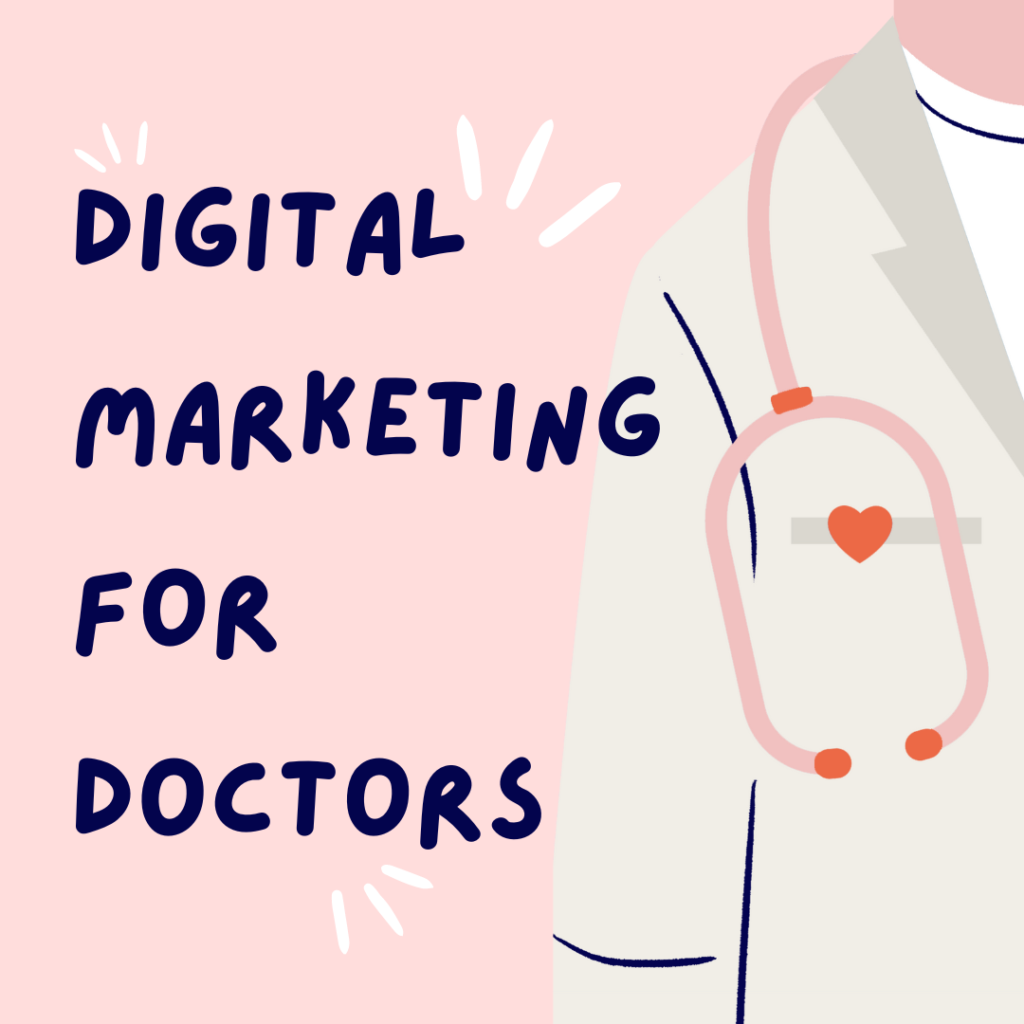Marketing is all around. From our phones to the grocery shop, someone is trying to sell us something everywhere we look. Now, if you’re a business or a start-up in the marketing world and are thinking about using marketing to reach your business, then having solid knowledge about different types of marketing is necessary.
However, businesses, especially start-ups, often mix affiliate and digital marketing. But what’s the real difference between them? Also, how exactly do these types of marketing work?
In this blog, Search Engine Publication will answer all of them. Put on your seat belt and get ready to dive into the marketing world!
Digital marketing vs affiliate marketing: Definitions comparison
Simply put, Digital Marketing stands for promoting your business digitally. The primary objective of digital marketing is to access and engage your target audiences through marketing campaigns, technical SEO, and effective sales methods to increase brand awareness.
Digital marketing involves using digital tools such as mobile devices, computers, and other electronic devices to advertise products and services to customers.
On the other hand, Affiliate Marketing is a deal between a company/product owner and another company or influencer promoting products for a commission. Affiliate marketing is performance-based marketing, which means you perform, and, in return, you earn.
Anyone can do this marketing through successful online business, affiliate links, vlogging, and direct response copywriting by using social media platforms. Remember, as an affiliate marketer, your business earns a commission when you sell a product.
Key features: Affiliate marketing vs digital marketing
Affiliate and digital both fall into marketing. But a few salient features make them different from each other.
Affiliate marketing components
1. Product owner: You need a company or business that makes products or services for affiliate marketing. The products and services can be both physical and virtual. The great facility of affiliate marketers is they do not need to own anything to promote products.
2. Affiliate marketer: Affiliate marketers use their brand personality and content in digital channels to sell products to the product owners. They reach potential customers by using different digital marketing strategies.
3. Affiliate networks: An affiliate network is the meeting place between the product owners and the affiliate marketer. Affiliate networks facilitate partnerships, offering affiliates tracking links, commissions, and payment processes.
4. Target audiences: Targeted customers are the core of affiliate marketing. They purchase products from affiliate marketplaces.
Digital marketing components
Digital marketers focus on three major components while making a digital marketing strategy. They are-
1. Content marketing: Content creation and content marketing is the most important task in digital marketing. It is mainly through content creation a digital marketer builds individual branding on digital platforms. Content can come in various formats, such as video marketing and blogging, to reach potential customers.
2. Search engine optimization (SEO): Only making content is not enough if you want to stand out among others. Digital marketing involves optimizing your content to rank in the search engine to increase brand awareness. But SEO takes time to show results, and these results are worth the wait.
3. Digital channel: Different online digital marketing platforms are great ways to reach the target market. However, content creation can happen using different marketing strategies such as email marketing, social media marketing, etc.
Digital marketing channels
The digital marketing platform is usually called a digital marketing channel. Digital online channels help digital marketers build brand awareness and increase web traffic and lead generation.
The most used digital marketing channels are:
- Search Engine Optimization (SEO)
- Social Media Marketing (SMM)
- Content Marketing
- Email Marketing
- Pay-Per-Click (PPC) advertising
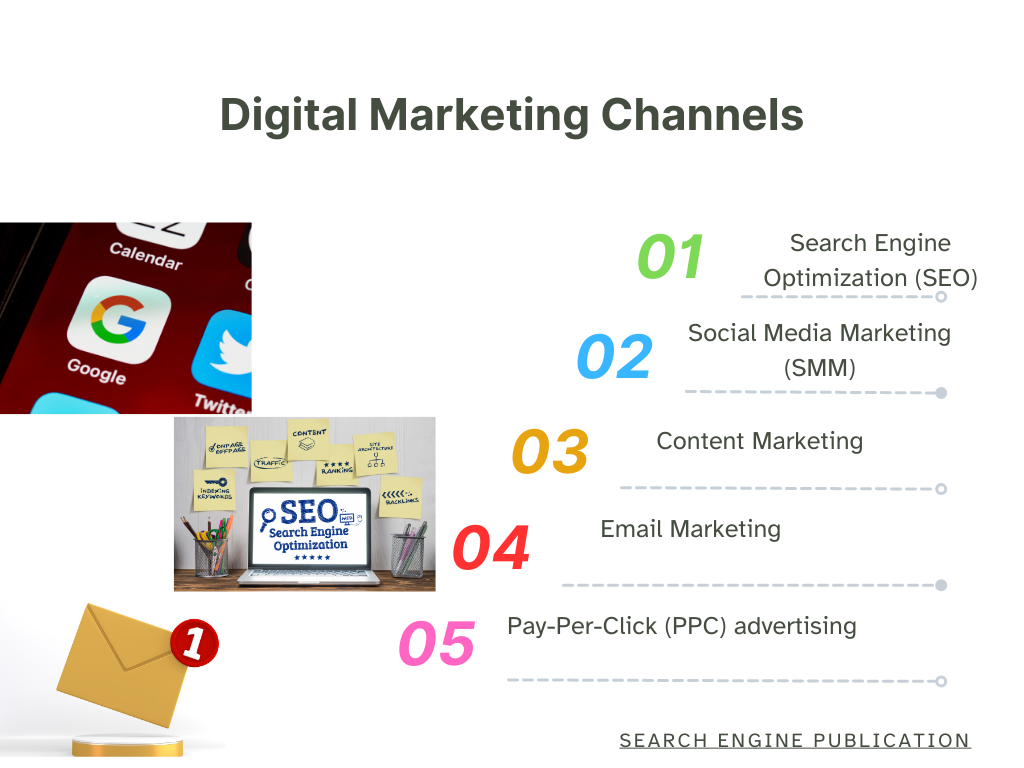
Types of Affiliate Marketing
Many affiliate marketers define the types of affiliate marketing from different perspectives. However, the key two types of affiliate marketing are:
Unattached affiliate marketing
In this affiliate program, you advertise products or services without directly interacting with the advertiser. Instead, affiliates use generic affiliate links to advertise products through platforms like Amazon associates, Clickbank, commissionjunction, etc.
Involved affiliate marketing
Sometimes, YouTubers do affiliate marketing, like sharing their personal experiences after using a product or doing food reviews promoting a restaurant. These types of marketing are called involved affiliate marketing. The marketers are directly involved with the audience and generate sales through affiliate links. Conversely, in related affiliate marketing, the product may not align with the marketer’s niche, but the marketer can still advertise the product on a personal blog or site.
5 affiliate marketing strategies to know in 2024
The virtual world is bombarded with plenty of marketing advice. But don’t get overwhelmed. Rather follow these strategies:
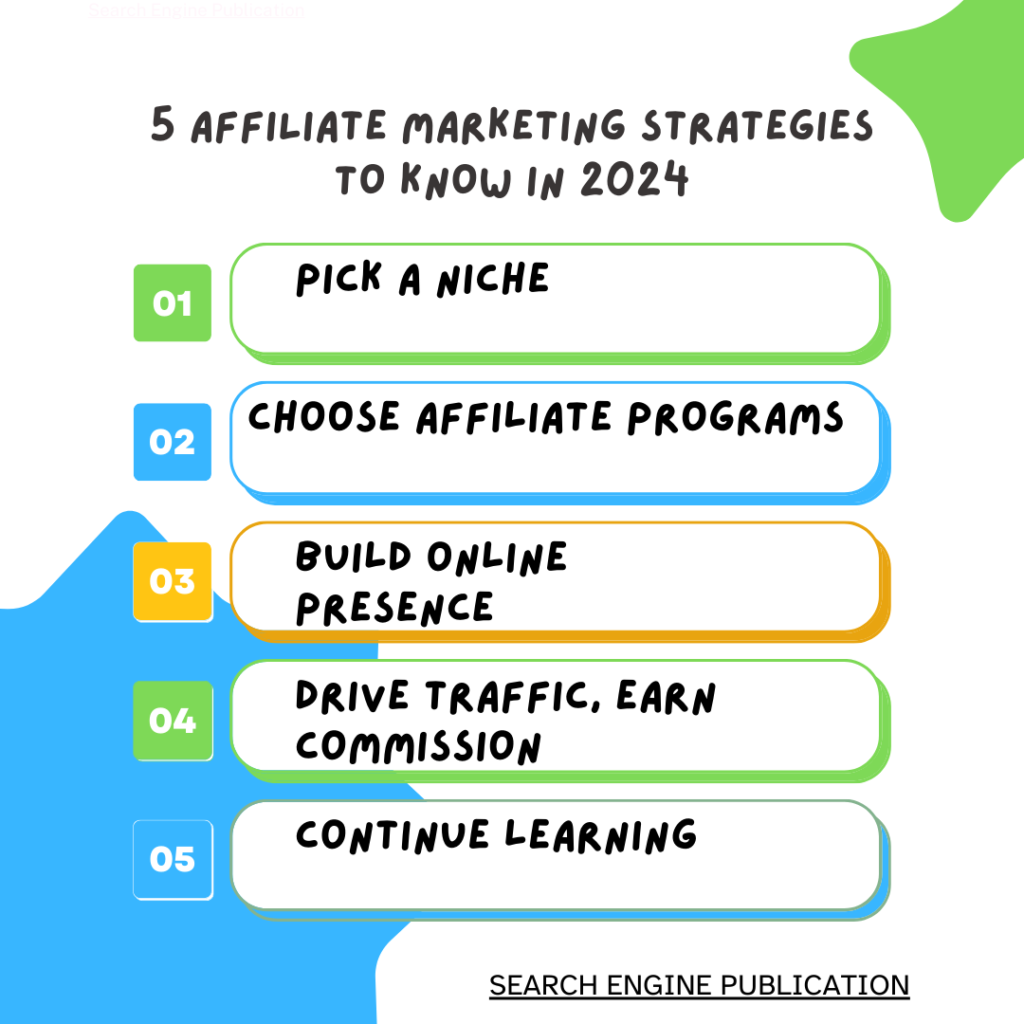
1. Pick a niche
There are plenty of products and services to promote as an affiliate marketer. Hence, breaking down the product you genuinely love to sell is wise. Successful affiliate marketing relies on choosing the right product before everything. Here is a list of high-paying affiliate niches by the site authorityhacker in 2024.
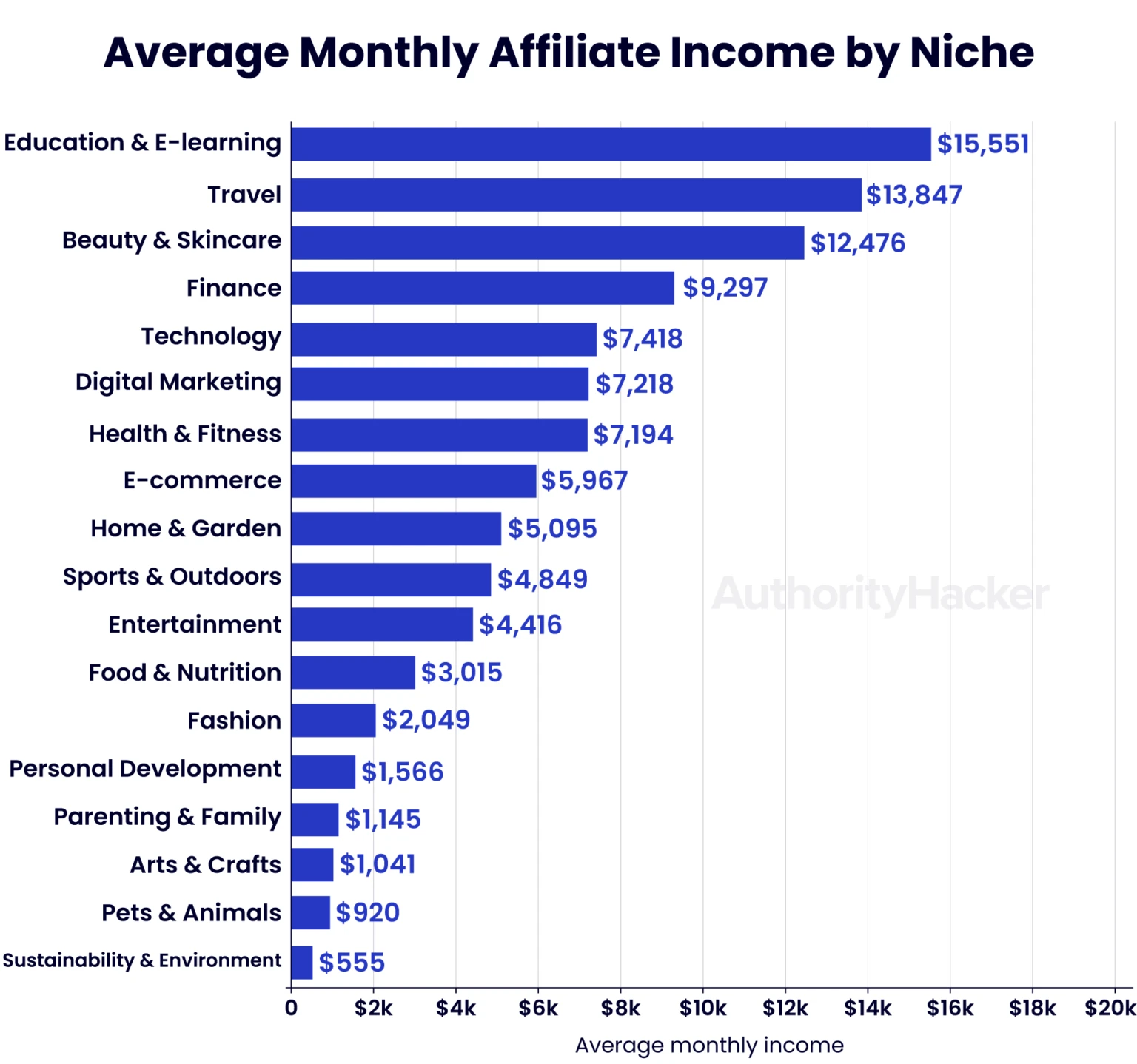
2. Choose affiliate programs
When you know your niche, look for a relevant affiliate program. In this stage, consider factors like commission rates, payment terms, and affiliate support in case of difficulties. Amazon, eBay, and Partnerstack are some of the highest-paying affiliate programs you can start with, depending on your niche.
3. Build online presence
When you’re into an affiliate marketing game, try hard and build your online presence through content creation. Contents like a blog, website, YouTube video, or social media profile are great ways to start. It is through your content that your target audience gets to know you and the products you promote.
4. Drive traffic, earn commission
Strong affiliate marketing strategies, such as SEO, social media marketing, email marketing, guest blogging, and paid advertising, can drive your target audience to your site and ultimately generate revenue. But don’t forget to check the affiliate’s tracking link and active engagements with your audiences to keep the flow going.
5. Continue learning
When you are in digital mediums, doing marketing, you continuously learn. And the best decision is never to stop learning. Stay updated with digital marketing strategies, optimize your content for search engines, provide the best to your audiences, and continue learning.
Differences between digital marketing vs affiliate marketing
Digital and affiliate marketing are similar because they happen online but differ in numerous ways. Here are seven key differences between digital and affiliate marketing.
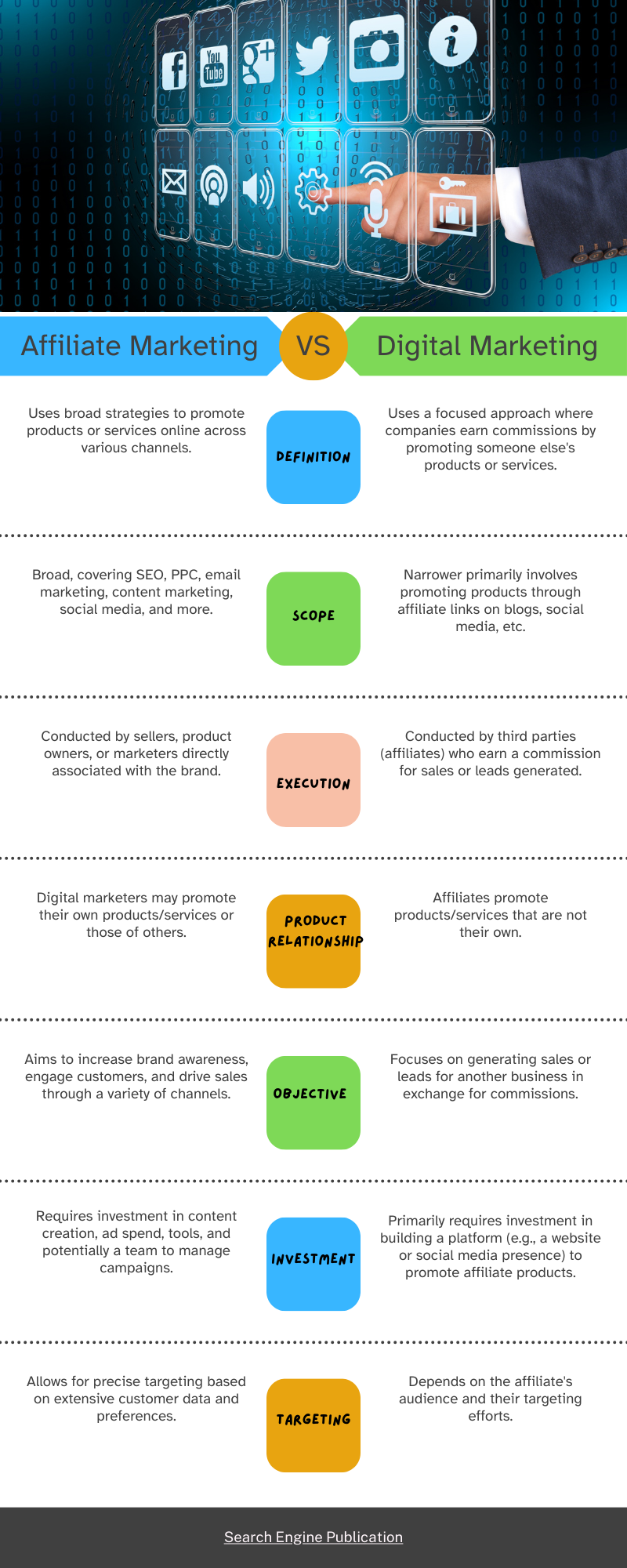
Affiliate marketing vs digital: Figuring out the best choice
When deciding between digital marketing and affiliate marketing, consider understanding what skill set and resources you have. For instance:
Freedom of choice
If you want to control your digital presence independently, such as what campaigns to run, apply digital marketing techniques, and what kind of content to make, digital marketing will give you the freedom you want. In contrast, affiliate marketers rely on the products they promote to make decisions like what type of content to create, in which medium to publish, etc.
Control
In digital marketing, companies play around with their marketing campaigns just how they like it. They can tweak messages, pick who sees their ads, and decide when their campaigns go live. It’s like having a magic wand for marketing. On the flip side, when it comes to affiliate marketing, the affiliates get creative with the content. Companies might not have as much say in how their products or services strut their stuff out there.
Targeting
With digital marketing, companies get super specific, targeting campaigns based on what customers love and need. It’s like sending a personalized invite to your party. Affiliate marketing, though, depends on the affiliates’ guest list. They might be bringing folks to the party you hadn’t thought of, which could be cool but also a surprise.
Results
When it comes to seeing how well your marketing efforts are doing, digital marketing is like having a dashboard full of dials and gauges. You can see who’s visiting your website, buying, and what’s catching their eye. It’s pretty handy for figuring out what works and what doesn’t. Affiliate marketing gives you results too, but it’s more like getting a postcard from a friend telling you about their trip. It’s great to hear from them, but you might not get all the details you’re curious about.
Affiliate vs digital marketing: The choice is yours
Lastly, the choice is yours. No one can decide which marketing is best for your business.
Wrapping up our journey through digital and affiliate marketing, it’s clear that it’s not really about picking a winner. Instead, it’s about celebrating what makes each option special. Choosing between digital and affiliate marketing? That’s a strategic move, depending on all the cool stuff we’ve discussed.
Today, businesses might find a goldmine by combining both strategies. Imagine blending the wide canvas of digital marketing with the precise brushstrokes of affiliate partnerships. It’s all about creating a marketing masterpiece that plays to the strengths of each approach, ensuring your message reaches the right ears in the most engaging way possible.

